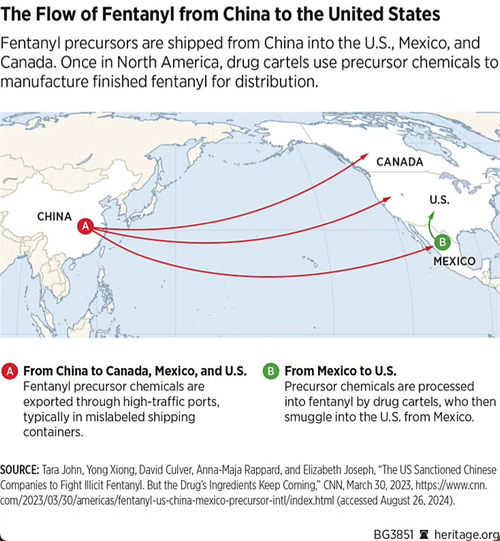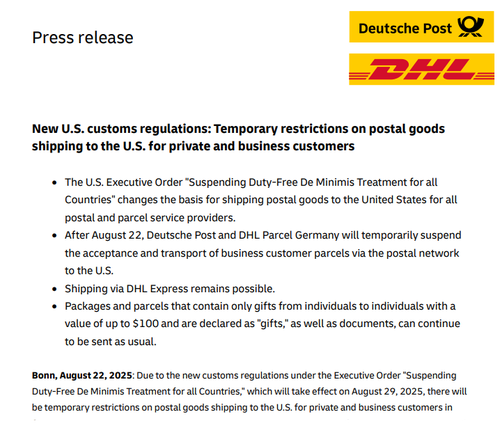Trump Closes De Minimis Loophole As Dark Chapter In Trade Ends
The long-standing “de minimis” exemption, which allowed small packages valued less than $800 to enter the U.S. duty-free, officially ended Friday. This closes the dark chapter on an era when China flooded America with cheap junk (think $10 Bluetooth wireless speakers) and, according to many in the America First movement inside the White House, helped flood the nation with fentanyl precursor chemicals – if not fentanyl itself – and fueled the drug-death crisis unlike anything this nation has ever seen. Think of it as a modern-day reverse Opium War (hybrid warfare by the CCP).
For those with a background in Latin, “de minimis” translates to “too small to matter.” But that’s certainly not the case. Since 2015, the number of packages entering the U.S. under this exemption has surged from 134 million packages per year to 1.36 billion by 2024. Much of this flood originated from Chinese e-commerce giants, including SheIn Group and Temu.
The decade-long tsunami of small packages flooding the U.S. didn’t just undercut domestic small businesses. It also created a backdoor for illegal drugs and fentanyl precursor chemicals from China to slip in undetected, fueling the drug-death crisis now killing more than 100,000 Americans every year.

“The de minimis exemption has been abused, with shippers sending illicit fentanyl and other synthetic opioids, precursors, and paraphernalia into the United States in reliance on the lower security measures applied to de minimis shipments, killing Americans,” the White House stated in late July.
Washington-based Greg Husisian, head of the international trade practice at Foley & Lardner, told Bloomberg that President Trump “actually had bipartisan support” in tackling the de minimis exemption mess.
“This was intended for grandma sending over an $80 package of toys, not like a huge Chinese company sending tens of thousands of packages every single day of $12 T-shirts,” Husisian pointed out.
Under the new rules enforced today via Trump’s executive order signed in July, all foreign shipments, except verified gifts under $100, will face new duties.
We pointed out last week (read the report) that several global postal office services warned about emerging bottlenecks in U.S. inbound shipping lines over confusion about duty collections:
- Asia: Korea Post and SingPost are halting standard parcel services, while Japan warns of delays.
-
Europe: Norway, Finland, Austria, Belgium, Czech Republic, and the UK are suspending or limiting services; Deutsche Post/DHL halted business parcels via postal networks.
-
Australia: Transit shipments through Australia to the U.S. are paused, though direct U.S. deliveries remain.
Multinational logistics company DHL warned customers one week ago about mounting confusion over how duties would be collected.
“Key questions remain unresolved, particularly regarding how and by whom customs duties will be collected in the future, what additional data will be required, and how the data transmission to the U.S. Customs and Border Protection will be carried out,” DHL stated in the letter.
Millions of low-value packages today will lose their duty-free treatment and be subject to standard tariff rates or temporary flat fees of $80 to $200 per item for a period of six months.
For more details on rates. Customs and Border Protection outlined earlier this month in a bulletin how the flat fees would be calculated, corresponding to the countries’ tariff rates.
“It is a real concern that the dominoes are falling and there will be a ripple effect where more and more posts announce that they will be suspending packages to the US,” warned Kate Muth, executive director of the International Mailers Advisory Group, which represents the U.S. international mailing and shipping industry, quoted by Bloomberg last week.
Tyler Durden
Fri, 08/29/2025 – 08:25
Source link
















